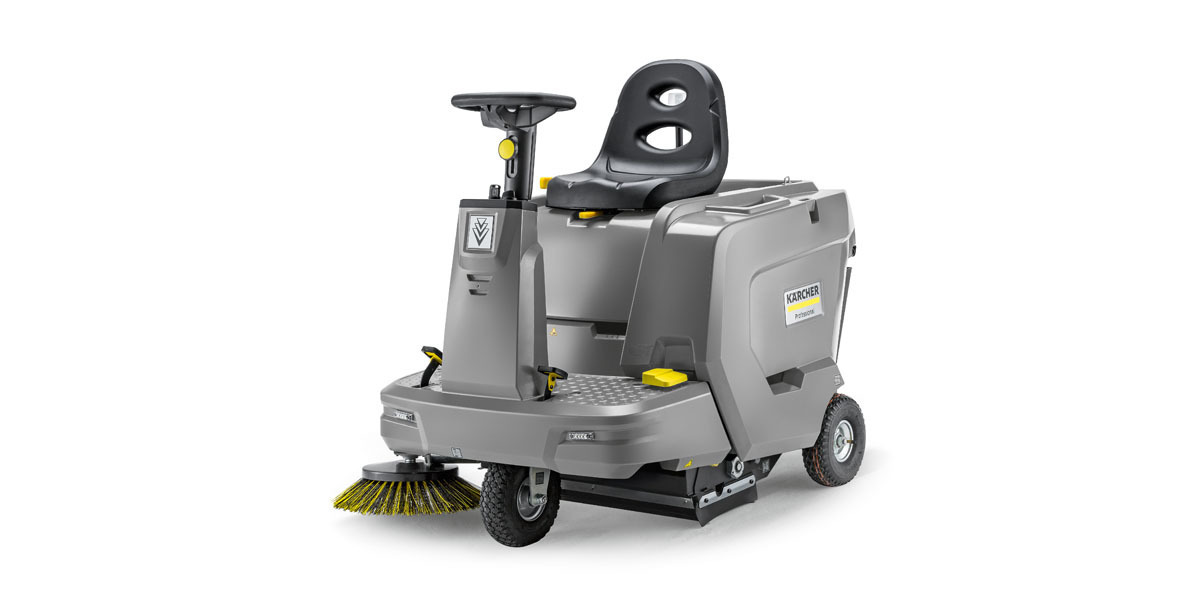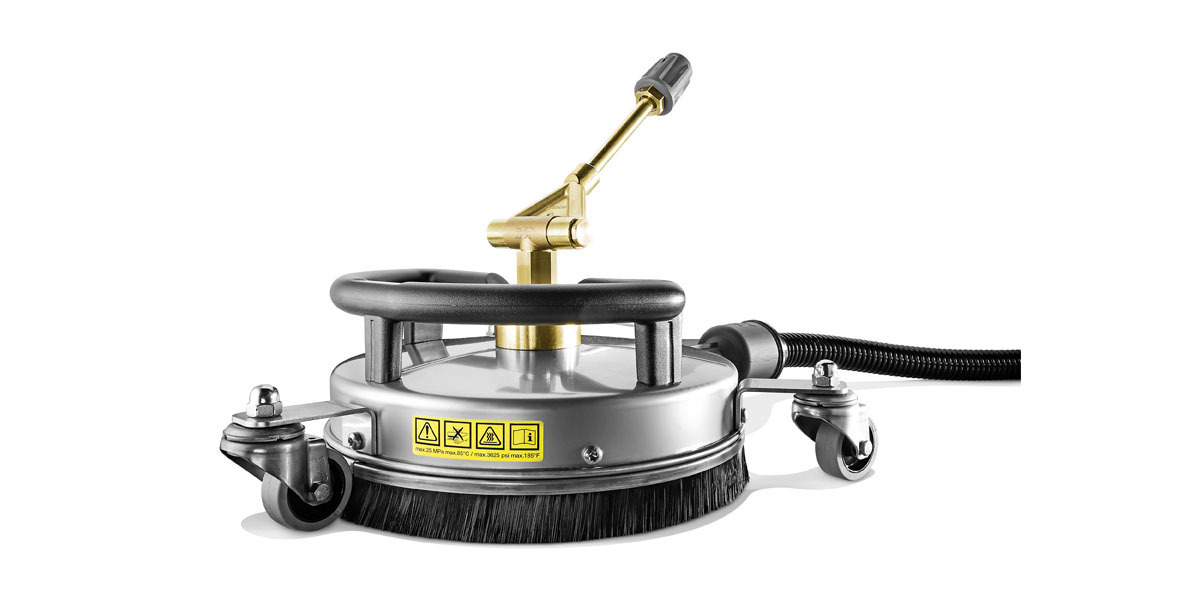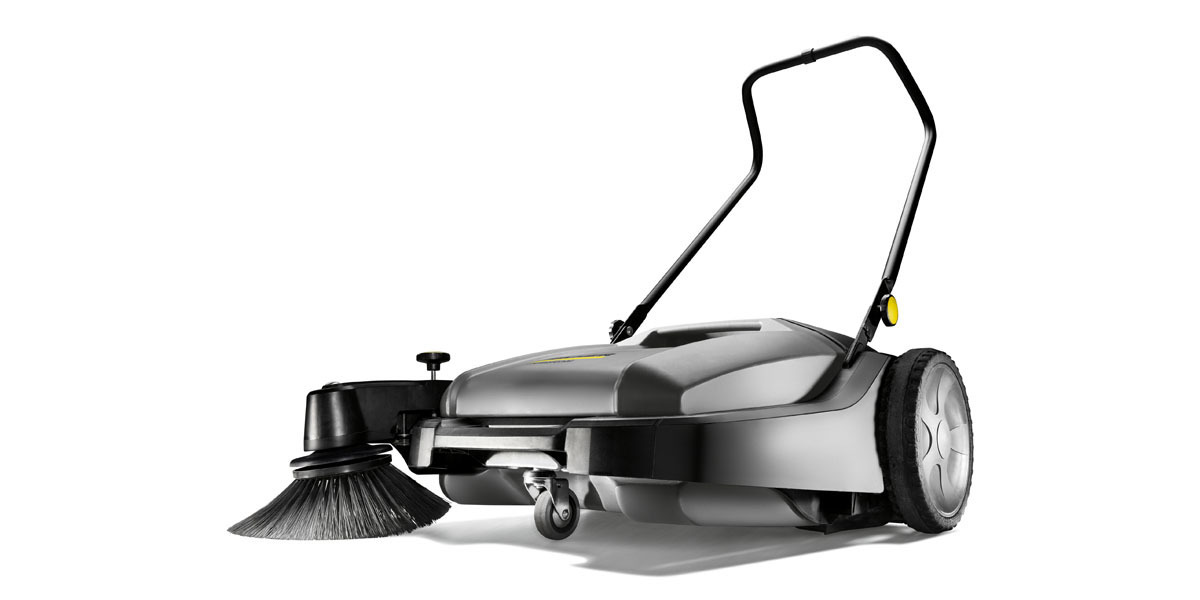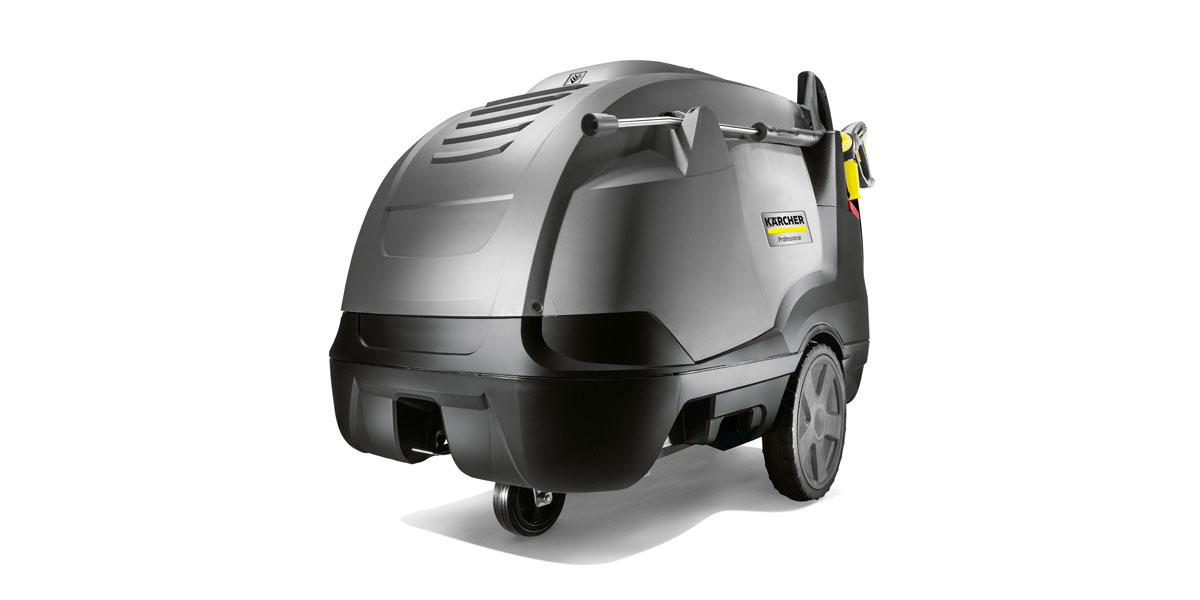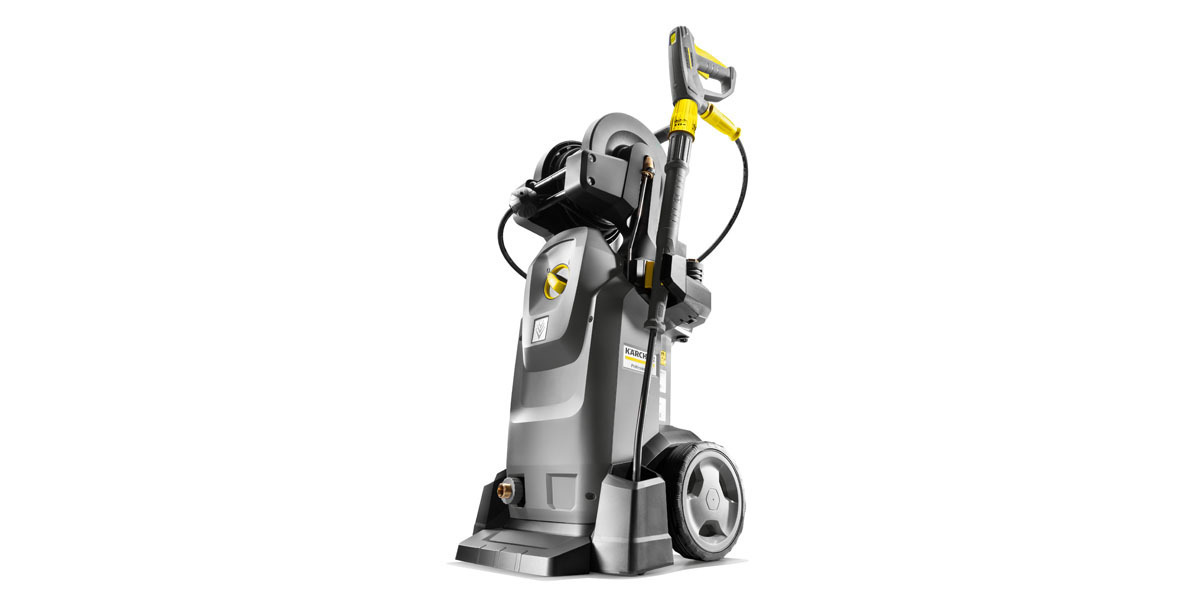Forecourt cleaning
Forecourt cleaning – regularly and economically: This is a central task for every service station operator. Firstly, because this area is susceptible to heavy dirtying. Secondly, because the cleanliness of the forecourt is decisive for ensuring that the customers feel at ease. And hence also for the sales in the shop. What service station operators should bear in mind when cleaning the forecourt – an overview.
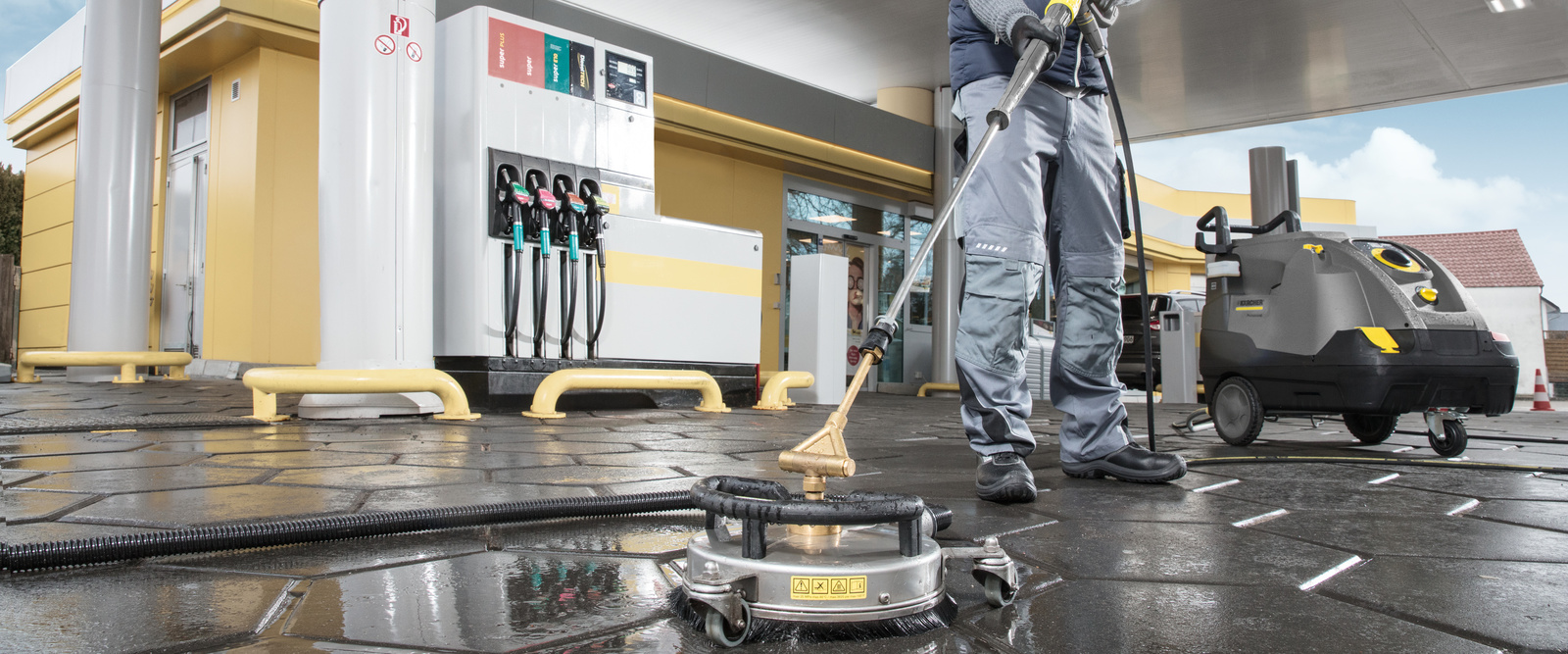
Different types of dirt
Dirt is a constant issue on service station forecourts. Paper tissues are inadvertently dropped, food leftovers end up on the ground. Drink cans and snack packets are left lying around the litter bins. Petrol drips onto the ground, as does the dirty water from windscreen washing. Chewing gum sticks stubbornly to the ground and there are patches of oil. The autumn wind blows leaves into the service station, and in the winter the vehicle tyres leave snow and grit on the forecourt. And on motorways and main roads, passing lorries swirl up large quantities of loose dirt from the roadside, which again settles on the service station forecourt.
Cleaning the forecourt – increasing sales
Cleanliness on the service station forecourt creates trust and increases sales. If the forecourt has a tidy and clean appearance, this will rightly be perceived as a sign of quality, customer-friendliness and good service. The customers go into the shop to pay with a positive feeling, and are then more inclined to spend money there.
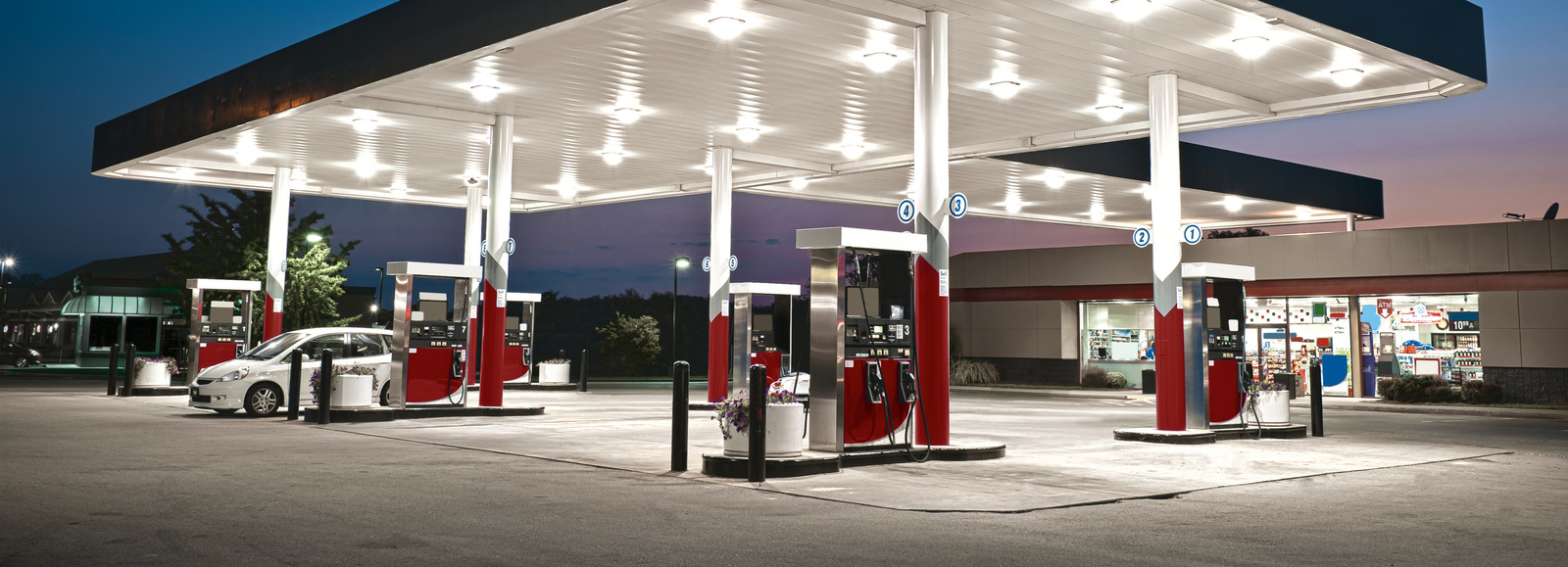
Forecourt cleaning: Diverse tasks, different types of dirt
The cleaning tasks on the service station forecourt are extensive and varied. They can therefore only be accomplished economically if suitable technology is used. The right equipment enables service station operators to reduce the amount of work effort required, while increasing customer satisfaction. Powerful cleaning machines make it possible to ensure clean, tidy and safe conditions on the forecourt – with low labour costs.
In principle, the right machines for cleaning the forecourt depends on the kind of dirt – loose or adhering. In addition, the size of the area plays a role.
Be on the safe side: Pay attention to regulations
The use of cleaning machines and chemicals at service stations is also partly regulated by law. Professional associations and oil companies also have regulations for equipment and cleaning agents, because workplace, health and environmental protection is especially important in consideration of the hazardous materials and substances that are in use at service stations. It is therefore essential for service station operators to be familiar with the respective regulations.
Loose dirt on the forecourt
Operators should sweep the outside area of the service station, including the forecourt, at least once a day. Otherwise loose dirt will collect in the crevices. This would unnecessarily increase the work effort required.
Furthermore, a clean outside area also means less dirt in the shop: Regular cleaning of the outside area is thus a preventive measure.
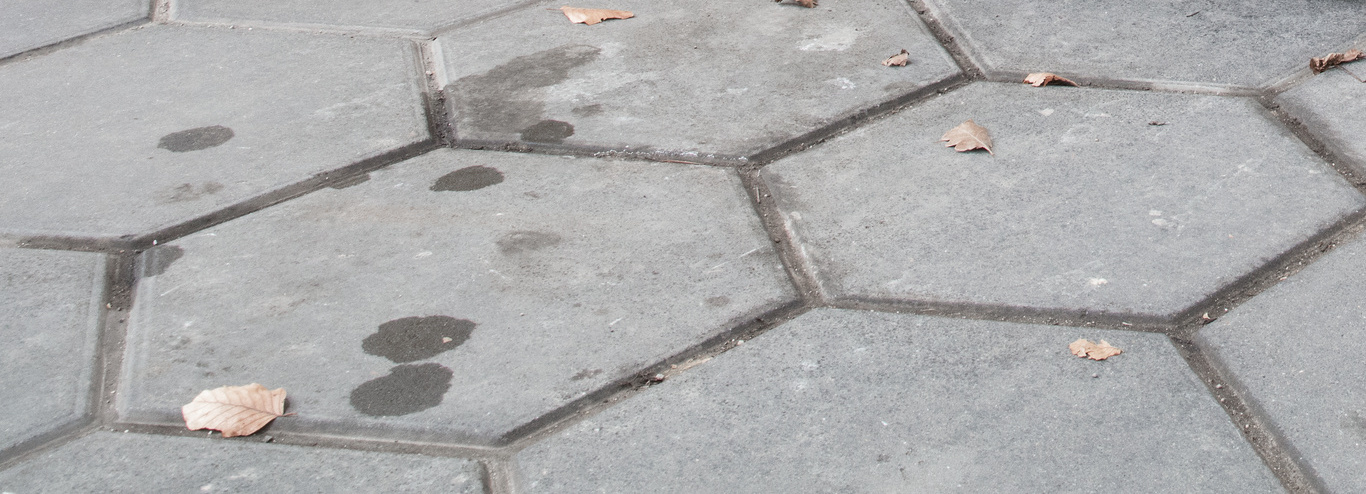
For smaller areas: Push sweepers
The simplest solution for daily surface cleaning of the forecourt is a push sweeper with push handle. They do not generate much noise, are very manoeuvrable and easy to handle.
A modern push sweeper can clean 2800 to 3600 square metres in one hour. By comparison: With a conventional broom, one person can clean 120 to 160 square metres per hour – and swirls up a significantly greater amount of dust. Push sweepers are thus also worthwhile for smaller service stations.

Tip 1 – double-sided drive:
When purchasing a push sweeper, it is advisable to make sure that the main sweeper roller is driven via both sides. It will thus also be easy to clean crevices, edges and tight bends on the service station forecourt, because thanks to the double-sided drive the sweeper roller can rotate both in left-hand and in right-hand bends.
Tip 2 – two side brushes:
In addition, two side brushes facilitate the work on corners and edges around the petrol pump pedestals. The machine can thus approach and sweep around curves and edges on both sides. Loose dirt is swept out of corners and under the sweeper in a circular motion. From there it is moved dust-free into the dirt container.
For middle-sized areas: Push vacuum sweepers
The next performance level is the vacuum sweeper. These machines achieve a sweeping performance of up to 4725 square metres an hour. During the sweeping process, the vacuum sweeper swirls up the dirt with a roller brush, vacuums it by means of a suction turbine (blower) and separates it in a filter system.
Vacuum sweepers have a traction drive. They are somewhat wider than sweepers, but just as ergonomical, and (with the right equipment) they can clean the tight bends and corners on the forecourt just as well. Because the operator walks with the sweeper as it is pushed around, they are also called "walk-behind machines".
Purchasing a vacuum sweeper is worthwhile from an area of 300 square metres. In one hour, a walk-behind machine can clean 3375 to 4700 square metres. Thus, not only the service station forecourt is quickly cleaned. The machines are suitable for surface cleaning in the entire outside area: Entrances and exits, parking spaces and the areas around the air and water services, as well as the car wash.
For large areas: Ride-on vacuum sweepers
For leaseholders and owners of large service stations, purchasing a ride-on vacuum sweeper is worthwhile. With such a machine, one person can clean the entire service station forecourt very quickly.
There are electric and petrol-powered vacuum sweepers. Electric machines are usually recommended for use at service stations because they are quieter.
A powerful electric motor with at least 600 watts power can clean 6000 square metres and more in 60 minutes. Ride-on vacuum sweepers are also used in schools, municipal spaces or large DIY stores.
Thanks to a light steering transmission and a small turning radius, the vacuum sweeper is manoeuvrable and can be easily steered forwards and in reverse. Handling is uncomplicated and self-explanatory. The ride-on vacuum sweeper can also pick up coarse parts such as drink cans and – important in the winter – roll chippings.
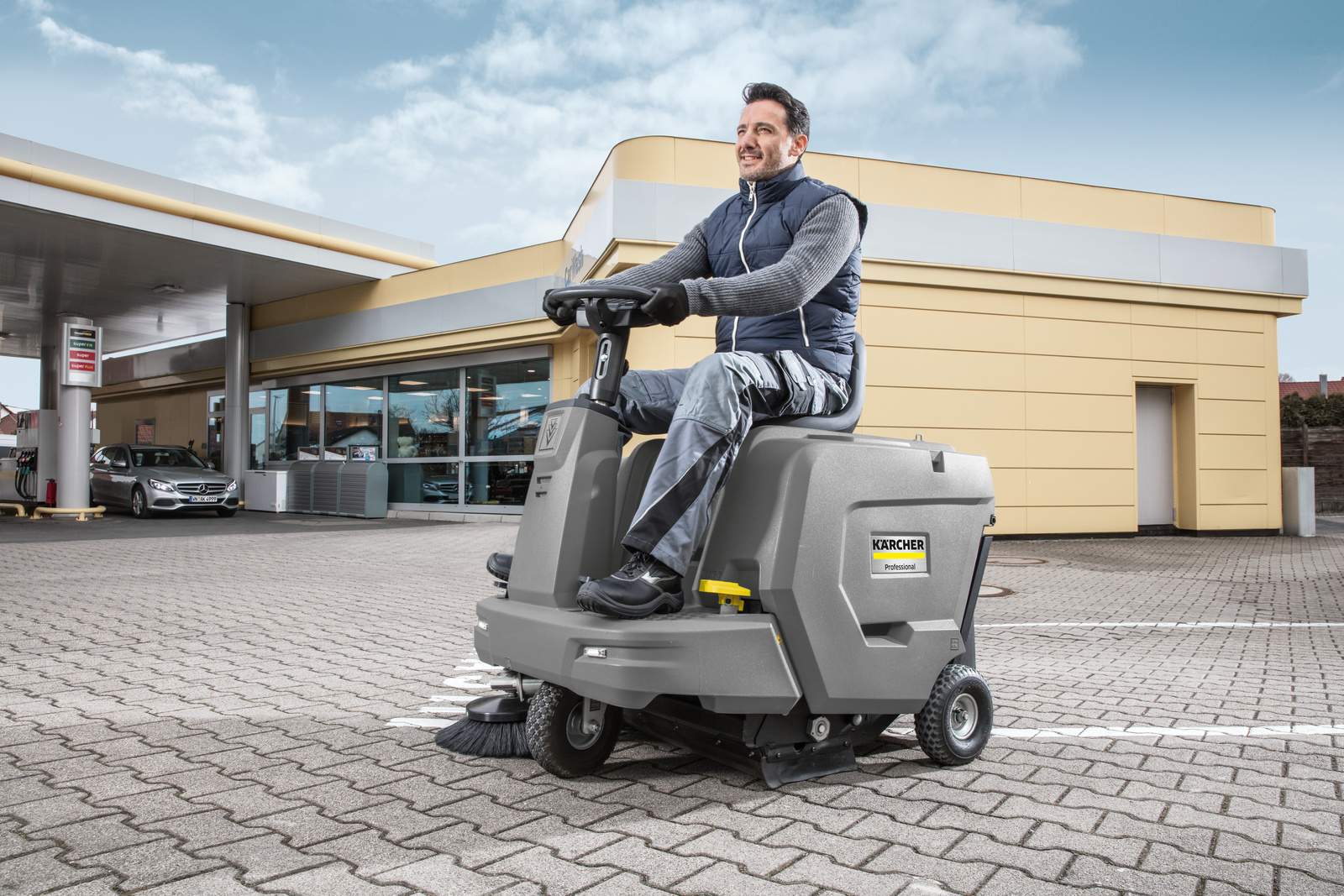
Tip 1 – self-cleaning filters:
When purchasing filters, service station operators should opt for large-area filters with an automatic self-cleaning function.
Tip 2 – generous dirt catch pans:
The machine should have a catch pan with a capacity of at least 50 litres.
Tip 3 – easy to maintain:
Filters and roller brushes should be easy to maintain and replaceable without tools. This makes maintenance flexible and possible independently of location.
Tip 4 – automatic or variable contact pressure:
Most ride-on vacuum sweepers have a pendulum-mounted main sweeper roller, by means of which the contact pressure is automatically adjusted to the surface. In the case of machines that do not have this function, it should be possible to vary the contact pressure, as otherwise the sweeper bristles will wear out.
Cleaning the forecourt of adhering dirt
In addition to daily surface cleaning with the sweeper or vacuum sweeper, every few weeks the forecourt should be cleaned of adhering dirt (deep cleaning). Oily and greasy dirt on the surfaces and carriageways is not only unsightly, it also has an off-putting effect on customers. Such dirt is also a slipping hazard and results in liability risks.
Spilt petrol and oily and greasy residues, as well as trodden-down chewing gum, all adhere to the surface. Deep cleaning must therefore always be carried out using high-pressure technology.
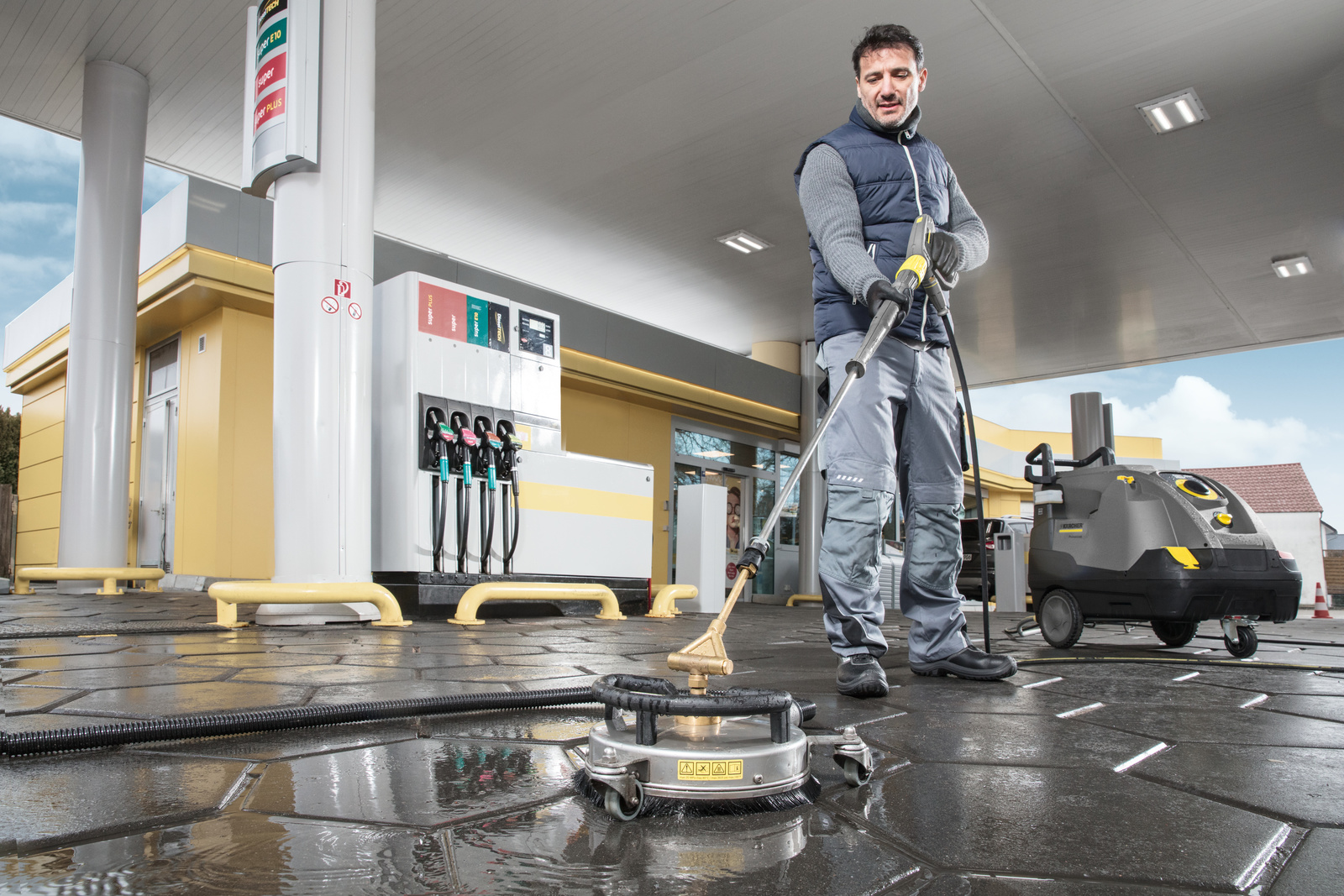
Mobile high-pressure cleaners
Modern high-pressure cleaners have different attachments and nozzles. Use of the right accessories reduces the required work effort and the consumption of cleaning agents and water. High-pressure cleaners are flexible and ensure the efficient cleaning of different surfaces.
With a high-pressure cleaner, therefore, not only can the forecourt be cleaned, but also other areas of the service station, for example, wash halls or façades, can be cleaned. For reasons of fire and explosion protection, the machine itself must always be at a sufficient distance from the forecourt. The cleaning personnel should use the length of the hose for cleaning the area surrounding the petrol pumps. This is the best way to remove adhering dirt on the forecourt – depending on the type of dirt and surfaces.
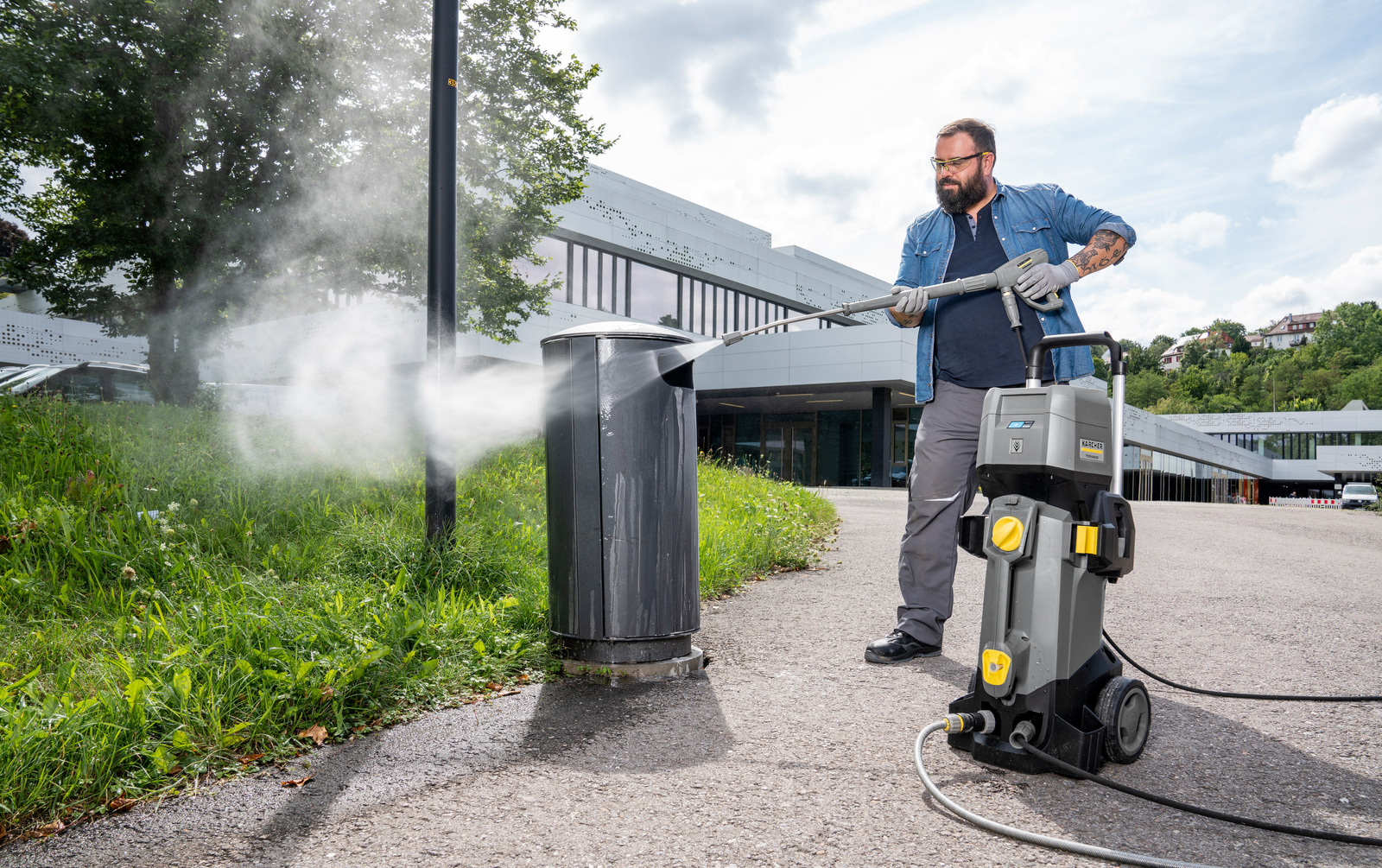
Smooth surfaces around the petrol pumps
On smooth surfaces such as plastic, metal and aluminium, disease-carrying germs survive even over a long period. The petrol pump nozzles, for example, can easily become breeding points for germs. Since the coronavirus pandemic, customers have become particularly aware of this.
It is therefore advisable to regularly clean not only the ground in the forecourt, but also the petrol pumps, and to eliminate disease-carrying germs from the pump nozzles. Using electrically powered high-pressure cleaners, support girders and rubbish bins can also be safely and reliably sprayed down.
Tip – hot water:
Hot water dissolves greasy and oily dirt better than cold water. And it also helps to remove graffiti and stickers. Less cleaning agent is thus needed.

Difficult to access: Crevices
Often, the ground in the forecourt is covered with non-slip concrete tiles. Dirt tends to accumulate in the crevices between the tiles. The impact protection bars around the petrol pumps also constitute a special problem in forecourt cleaning: The bars often consist of several metal pipes welded together. Dirt and oil residue can accumulate in the crevices and on the ground below the bars. But loose dirt can also collect here. Such dirt can be rapidly removed from the corners with a leaf blower.
Then the high-pressure cleaner comes into use: It gets into the crevices and cracks with a dirt blaster, which can sweep out the dirt with a cold water stream. Thanks to a rotating, sharp spray jet, the dirt blaster has almost double the collision force of a normal nozzle. With the high-pressure cleaning of large quantities of dirt, a lot of water can thus be saved.
In order to prevent the dirt being splashed in all directions, the high-pressure machine can be used with a surface cleaner. Depending on the height of the impact protection bars, flat models are suitable for cleaning the forecourt ground underneath the bars.
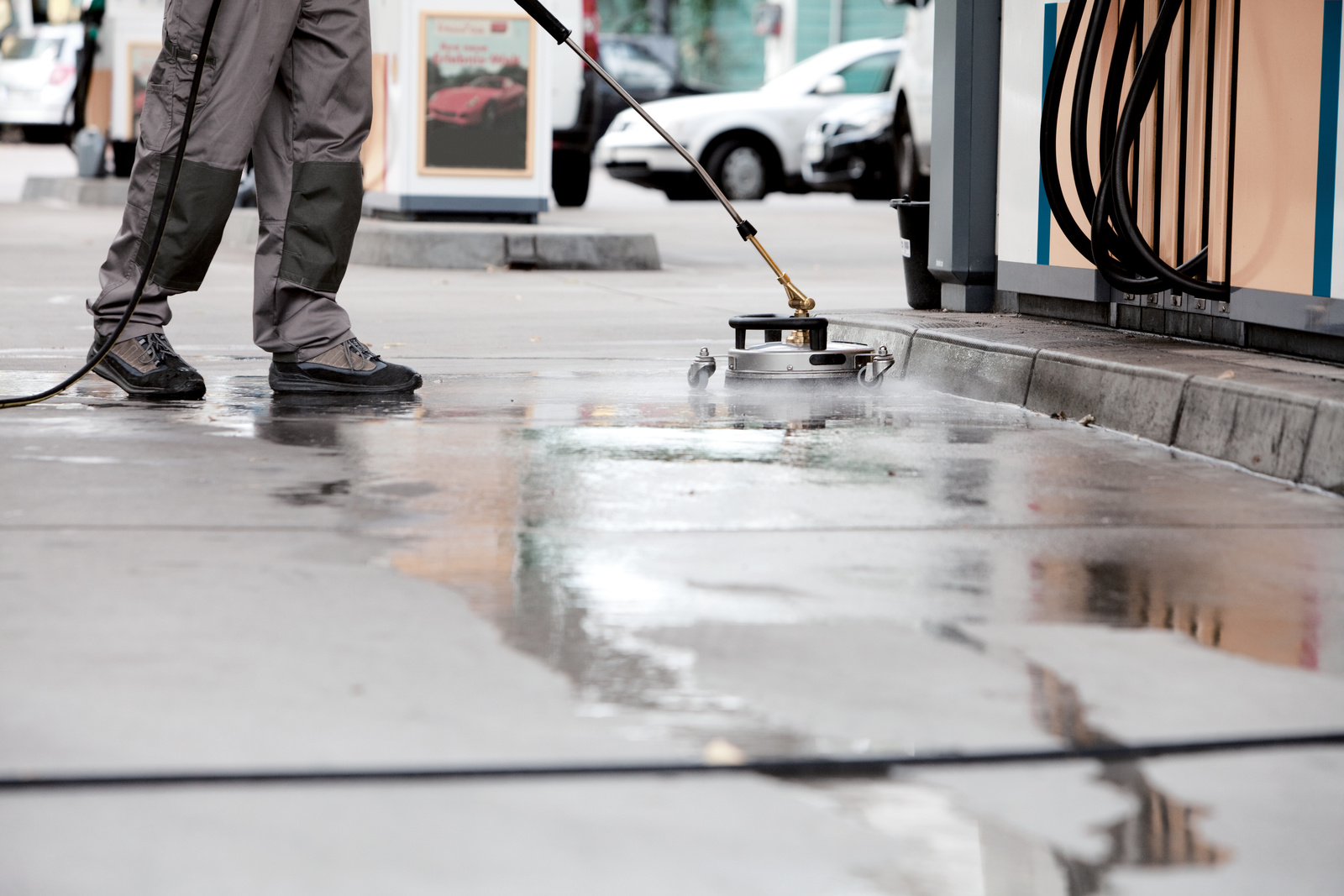
Oil patches on large areas
The large area of the forecourt can be cleaned with a hot water high-pressure cleaner. To do this, a hot-water-resistant surface cleaner attachment with stainless steel housing is fitted to the lance. This protects against splash water and drains off the dirty water in a controlled manner – which is important when there are members of the public on the forecourt. Oil patches can also be efficiently removed with the surface cleaner.
Tip 1 – easy separability:
When choosing the cleaning chemicals, it is important to ensure they can be separated easily so that the oil separator can do its work. The use of products that are not easy to separate damages the environment and violates the legal regulations.
Tip 2 – high temperature:
High-pressure cleaners should generate a water temperature of up to 155 °C, because greases, oils, protein residues and resins mostly dissolve at high temperatures. Service station operators thus need significantly less chemicals when they clean their forecourts – or can even do without chemicals completely. This protects the environment and saves costs. Furthermore, cleaning with hot water is faster, which again has a positive effect on the overall costs.

